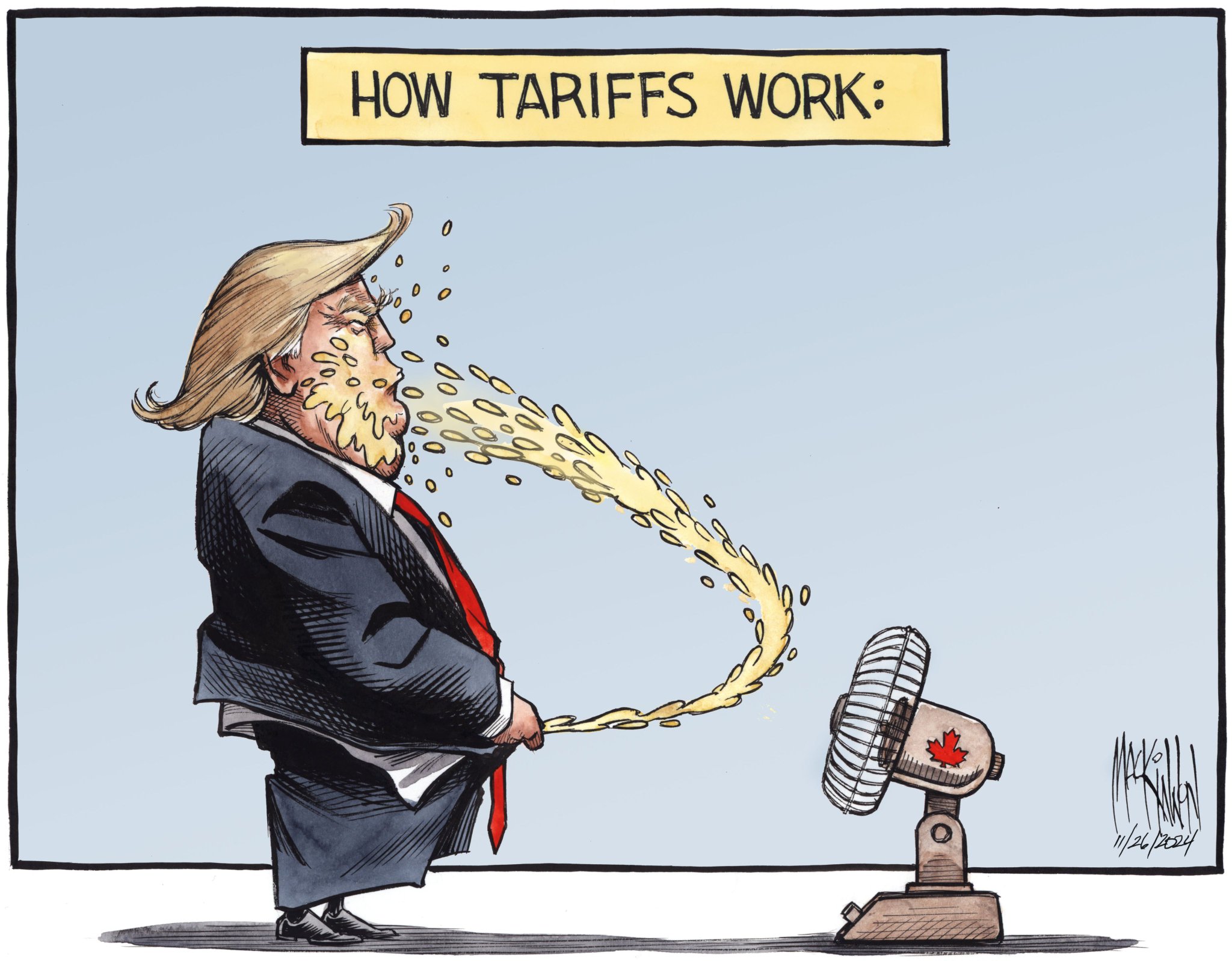Impact of Project 2025’s Trade Policies on the U.S. Economy and Consumer Prices
What trade policies and economic strategies does Project 2025 propose, and how might these affect the U.S. economy, international trade relations, and consumer prices?

Cartoon by Bruce MacKinnon.
Shared from the artist's post on Twitter/X for informational and commentary purposes.
Introduction
Project 2025 outlines a series of trade policies aimed at reshaping the U.S. economy with a focus on reducing reliance on foreign goods and renegotiating international trade agreements. While these policies are designed to protect American industries and promote domestic production, they carry significant risks. Potential consequences include increased consumer prices due to tariffs and protectionist measures, strained international trade relations, and potential disruptions to global trade networks. This analysis will examine the proposed trade strategies and their likely impact on the U.S. economy and consumer costs.
Proposed Trade Policies and Economic Strategies
Project 2025 advocates for policies that reinforce economic nationalism. The document suggests a reduction in reliance on international supply chains, emphasizing the importance of bringing manufacturing back to the United States. This approach includes incentivizing domestic production through tax cuts, deregulation, and potentially imposing tariffs on foreign goods to protect American industries. The focus is on revitalizing sectors such as manufacturing, energy production, and agriculture, with the intent of achieving self-sufficiency and reducing the U.S. trade deficit (Project 2025, 2024, Department of Commerce).
Additionally, the project emphasizes the need to renegotiate or withdraw from international trade agreements that are perceived as unfavorable to the U.S. This could include deals like the North American Free Trade Agreement (NAFTA) or the Trans-Pacific Partnership (TPP). The goal is to create agreements that better align with U.S. interests, ensuring that American workers and industries are not disadvantaged in the global marketplace.
Potential Concerns
While these policies aim to bolster the U.S. economy and reduce dependency on foreign goods, there are several concerns regarding their implementation. First, imposing tariffs and prioritizing domestic production could lead to higher consumer prices, as goods produced domestically might be more expensive than imported alternatives. This could disproportionately affect low-income consumers who rely on affordable goods.
Second, the emphasis on economic nationalism and renegotiating trade agreements could strain international trade relations. Countries that are affected by U.S. tariffs or trade policies may retaliate with their own tariffs, leading to trade wars that could harm the global economy. This could also weaken the U.S.’s position as a global leader in trade and economic policy, potentially isolating it from international cooperation.
Another concern is the potential impact on emerging markets and developing countries. By reducing imports and focusing on domestic production, the U.S. could inadvertently harm economies that rely on exporting goods to the American market. This could lead to economic instability in these regions, which might, in turn, create global economic ripple effects.
Implications of the Immunity Ruling
The immunity ruling, which grants significant legal protections to government officials and potentially expands executive power, could exacerbate concerns about the unchecked implementation of these trade policies. With limited accountability, there is a risk that these policies could be enacted in ways that prioritize short-term political gains over long-term economic stability and democratic principles. This lack of oversight could also lead to increased corruption and cronyism, further undermining the integrity of the U.S. economic system.
Conclusion
Project 2025’s trade policies and economic strategies reflect a shift toward economic nationalism and a focus on self-sufficiency. While these goals may appeal to those concerned about global competition and the loss of American jobs, they carry significant risks, including higher consumer prices, strained international relations, and potential harm to emerging economies. The implications of the immunity ruling further compound these concerns, highlighting the need for careful consideration and oversight to ensure that these policies do not undermine democratic values or economic stability.
By thoroughly examining these policies, we can better understand the potential impacts of Project 2025 and the importance of maintaining a balance between national interests and global cooperation.
“Trade Policies and Economic Strategies in a Nutshell”
Project 2025’s trade policies and economic strategies focus heavily on economic nationalism, emphasizing the need to prioritize American industries, reduce reliance on international supply chains, and potentially impose tariffs on foreign goods. The overarching goal is to bring manufacturing back to the U.S. and protect domestic industries from foreign competition. However, these strategies raise significant concerns.
First, imposing tariffs and prioritizing domestic production could lead to higher prices for consumers, especially for goods that are cheaper to produce abroad. This could hurt low-income families who rely on affordable products. Additionally, these policies might strain international trade relations. Countries affected by U.S. tariffs could retaliate, leading to trade wars that would disrupt global markets and harm the U.S. economy.
There are also concerns about the impact on developing countries that depend on exporting goods to the U.S. Reducing imports could destabilize these economies, potentially causing global economic disruptions. Furthermore, the focus on economic nationalism might isolate the U.S. from international cooperation, weakening its position as a global leader in trade.
The immunity ruling, which provides extensive legal protections to government officials, compounds these risks by potentially allowing the unchecked implementation of these policies. Without proper oversight, these strategies could prioritize short-term political gains over long-term economic stability and democratic values, leading to increased corruption and undermining the integrity of the U.S. economy.
In essence, while Project 2025’s trade policies aim to strengthen the U.S. economy, they carry significant risks, including higher consumer costs, damaged international relations, and potential harm to global economic stability.



